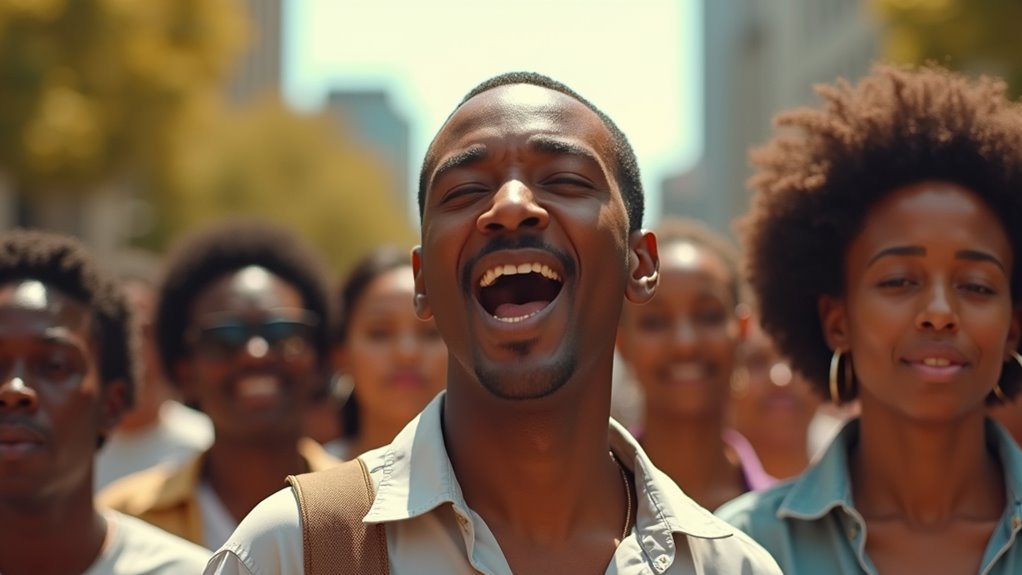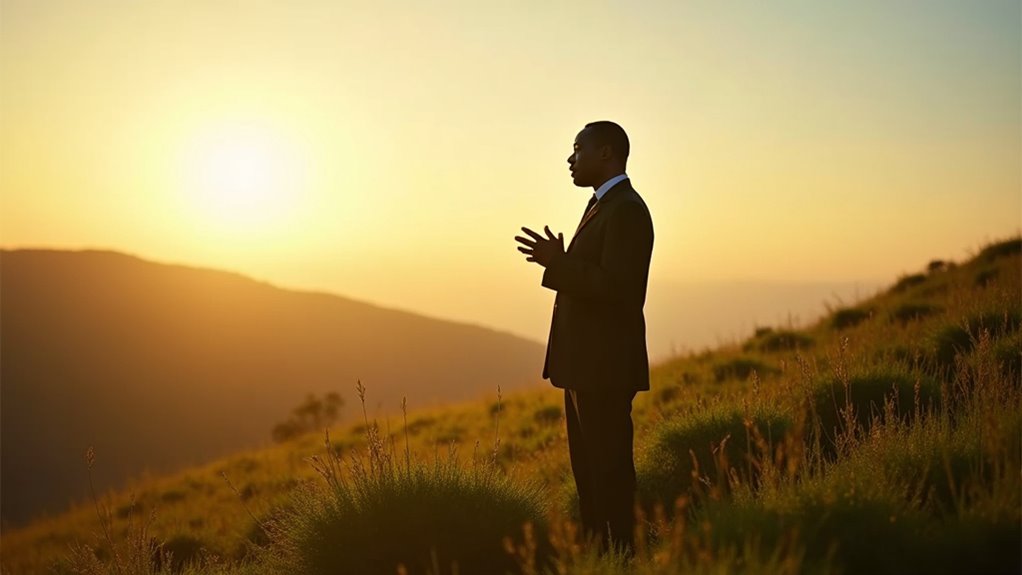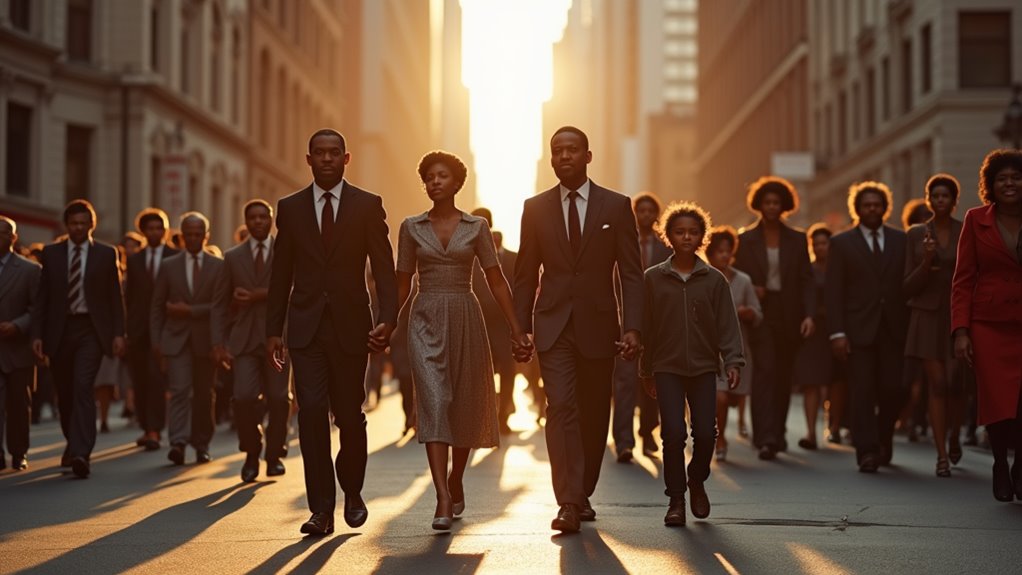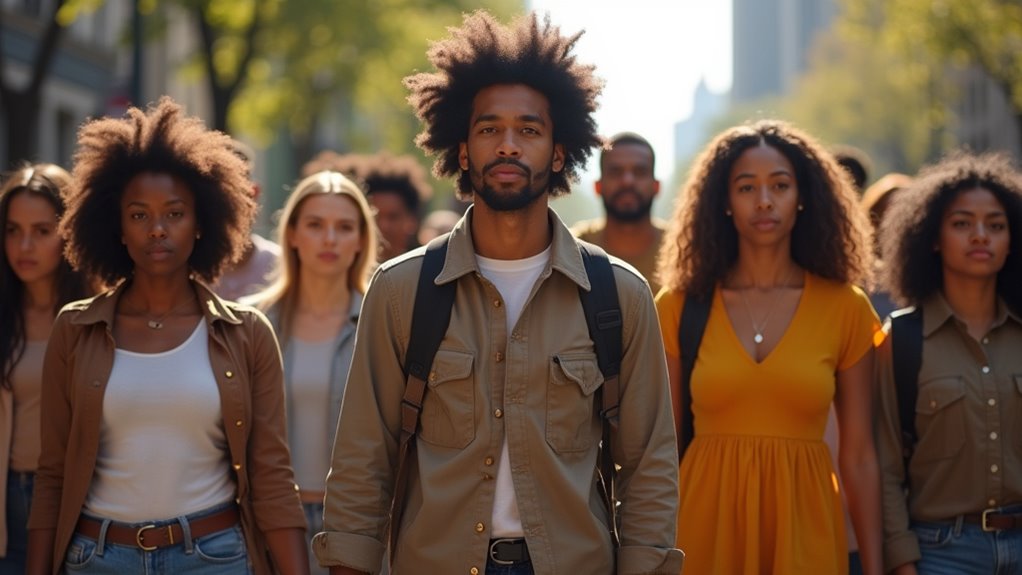What Motivated Martin Luther King Jr
Martin Luther King Jr. was driven by a profound Baptist faith, rooted in family traditions, and a determined commitment to end racial segregation, which he experienced firsthand in Atlanta. His inspiration from Gandhi’s nonviolent methods also shaped his approach to peaceful protest, leading to significant actions like the Montgomery Bus Boycott. Stay tuned for a deeper exploration of his motivations and lasting impact in the following sections.
Essential Facts in 30 Seconds
- Martin Luther King Jr.’s deep Baptist faith inspired his commitment to justice.
- Experiencing racial segregation in Atlanta drove him to fight against injustice.
- Gandhi’s nonviolent philosophy influenced his belief in peaceful resistance.
- His vision of a “Beloved Community” rooted in love and equality shaped his activism.
- A moral imperative to address systemic inequalities led him to practice civil disobedience.
Early Life and Religious Roots
Martin Luther King Jr. came into this world on January 15, 1929. He grew up in Atlanta, Georgia, on Auburn Avenue. This street buzzed with Black businesses and churches. His family shaped his life in big ways. His father and grandfather served as Baptist preachers. They worked at Ebenezer Baptist Church with strong faith. His parents taught him about slavery and racism. They also shared the Christian duty to love everyone.
As a child, Martin read the Bible out loud often. His grandmother Jennie told him powerful stories. These moments built his moral values early on. His father was strict and used whippings for discipline. Still, faith stayed at the heart of his life. Church was a regular part of his routine. His early exposure to racial segregation shaped his understanding of injustice from a young age.
His extended family on “Sweet Auburn” supported him. All this created a solid base for his future beliefs.
Influence of Nonviolent Philosophy
Martin Luther King Jr. grew up with strong faith and community values. His belief in nonviolent ways became the heart of his justice fight. He took ideas from Christian teachings and Gandhi’s peaceful methods. This shaped a strategy that avoided physical harm. Nonviolence wasn’t just a plan—it was his life. It took huge courage and emotional power to resist evil. He always aimed for peace and understanding with others.
Picture this—King believed in a fair world for everyone. He thought suffering could teach and change society. His dream was a “Beloved Community” of love and equality. His philosophy emphasized that nonviolence is a way of life, not merely a temporary tactic. Forgiveness played a key role in his approach, as it fostered reconciliation and healing among divided communities, reflecting his deep commitment to empathy and understanding with forgiveness and empathy.
Through speeches and sit-ins, he showed nonviolence works. Data proves his impact—over 250,000 people joined his 1963 March on Washington. His ideas still inspire social justice today. They focus on respect, not destruction. You can see his vision lives on! His emotional drive fueled his intrinsic motivation to create lasting change.
Leadership in Civil Rights Campaigns

Martin Luther King Jr. led powerful civil rights campaigns with great strength. His role in the Montgomery Bus Boycott of 1955 changed history. This 381-day protest fought against segregated buses in Alabama. It united communities and pushed for fairness on public transport. The Supreme Court finally ruled against such discrimination. That was a huge win for equality!
King also started the Southern Christian Leadership Conference in 1957. This group, known as SCLC, planned nonviolent actions across the South. They worked hard to end racial injustice everywhere. King’s smart ideas helped organize people for big change. His commitment to nonviolent resistance drew global attention to the cause nonviolent resistance drew.
His skills inspired thousands to join the fight. He showed how to stand up without violence. Every step he took aimed for a better future. His leadership built hope in tough times.
Let’s admire his courage and vision today!
Montgomery Bus Boycott
Courage sparked a major event in history with the Montgomery Bus Boycott. Rosa Parks’ arrest on December 1, 1955, started it all. She refused to give up her bus seat in Montgomery, Alabama. Her bold stand inspired many to fight back.
Black leaders planned a strong protest against unfair rules. Martin Luther King Jr. led with powerful ideas of peace. African Americans stopped using buses for 381 days straight. They walked or shared rides to show their strength. His internal drive pushed him to inspire a movement despite immense challenges.
Churches and communities joined hands to support each other. About 40,000 Black riders boycotted the buses every day. This hurt the city’s money since they relied on fares.
King’s speeches motivated everyone to stay united and calm. Finally, the Supreme Court ended bus segregation laws. Their victory showed teamwork can break down racism. Collective action changed history forever in Montgomery. King’s commitment was fueled by a deep desire for social justice and equality.
Founding SCLC Initiatives
Martin Luther King Jr. co-founded the Southern Christian Leadership Conference in 1957. This group became a strong force for change. It united local communities to fight for equality. They used nonviolent ways to protest unfair treatment.
Picture this—Black churches brought people together. Their strength built powerful support for the cause. SCLC started training to create bold leaders. Campaigns in Birmingham and Selma made history. Those efforts helped pass the Civil Rights Act of 1964.
SCLC focused on teamwork, not single members. They raised voices across the country. Voter registration drives grew with huge energy. Their determination never stopped pushing forward.
Imagine the impact—real change started happening! King’s leadership in SCLC inspired a motivated workforce to drive significant societal progress.
Vision for Equality and Unity
Martin Luther King Jr. had a bold vision for equality and unity. His dream inspired millions to fight for justice. In his famous “I Have a Dream” speech, he spoke clearly. He wanted people judged by character, not skin color. This idea touched hearts across the world.
His work led to big changes in laws. The Civil Rights Act of 1964 banned discrimination. Then, the Voting Rights Act of 1965 protected voting rights. These laws gave fair chances to everyone. Data shows millions gained access to vote after 1965.
Think about his focus on education and strong communities. These were steps to real equality. He also fought for fair pay and less wealth gaps. His voice reached beyond America for global peace. His dream was unity for all nations.
Take his legacy to heart. Break barriers with kindness and respect. Build a world where everyone stands together. Let purpose and unity guide your actions. His vision remains a powerful plan for change.
Spiritual Drive and Moral Convictions

Martin Luther King Jr. had a strong faith that powered his activism. His Baptist beliefs made equality a sacred rule to follow. He faced oppression with courage because of this belief.
Justice shaped every step he took for civil rights. He linked Bible lessons to the fight for fairness. For him, treating everyone right was a holy duty.
Love was at the core of his mission too. He believed we must care for others as ourselves. This idea came straight from the Gospels.
That love drove his peaceful protests and changed a nation.
Faith Fuels Activism
Faith powered Martin Luther King Jr.’s path as a civil rights hero. His strong belief in God shaped his fight for fairness.
Think of this—hate surrounded him, yet he chose peace. His Christian values, like loving everyone, guided his non-violent actions.
As a church leader, King’s Baptist roots built his moral strength. He led groups like the Southern Christian Leadership Conference with faith.
His beliefs united people to push for change together. The Bible’s teachings on forgiveness? They inspired his every step.
Truly, his spirit drove his mission forward.
Justice Guides Actions
Stand tall with a principle that shapes every step you take. Martin Luther King Jr. did just that. His deep belief in justice pushed him forward. He saw just laws as good and moral. Unjust laws, like segregation rules, hurt human dignity. He fought these with civil disobedience—a bold moral stand. He also celebrated court wins like Brown v. Board of Education.
His choices came from strong spiritual faith. As a pastor, he felt a duty to act. Nonviolence was his powerful tool. Protests and boycotts showed his fight against wrong. His approach inspired many to embrace nonviolent resistance strategies in their own struggles for justice.
Justice meant more than laws to him. It was a must for society. Every move he made had clear purpose. His commitment to justice inspired others to foster a culture of respect in their communities.
Love Inspires Change
Love powered Martin Luther King Jr.’s mission to create change. His deep spiritual beliefs shaped this love.
Think of love as a mighty force. It can touch hearts and alter minds. King used lessons from the Bible. He leaned on the Sermon on the Mount. This showed love could transform enemies into friends. Nonviolent ways helped him spread this message. Picture his bold dream for a better world. His intrinsic motivation drove him to inspire others through a genuine passion for justice.
Consider these key ideas from his journey:
- Forgive haters – Show love to those who hurt you.
- Face danger – Stay calm even under threats.
- Dream big – Hope for a united “Beloved Community.”
- Take risks – Give up safety for what’s right.
Love holds this incredible strength. It can guide you to improve the world. Stats show King’s impact—his work inspired millions. Over 250,000 people joined his 1963 March on Washington.
That’s the power of love in action. Let it inspire you today. Encouraging others with this love can help even in the darkest times, like supporting someone with persistent sadness.
Addressing Systemic Injustices

Systemic injustices run deep in our society. They hurt marginalized groups every day. Martin Luther King Jr. battled these unfair systems. He saw inequality in schools and jobs. This unfairness targets specific racial or economic groups. King pushed hard for economic justice. He wanted fair access to resources for everyone. Poverty, to him, was a built-in problem. Not just bad luck.
Take his Poor People’s Campaign as proof. It called for food and housing as rights. King backed a guaranteed minimum income too. This would cut economic gaps fast. He dreamed of big changes in society. Unified action, he believed, could end racism.
Data shows stark disparities even today. Black Americans earn 60% less than white Americans. That’s a real structural barrier. Recognizing these disparities can inspire individual motivation to drive collective action for change.
Feel inspired? Start by learning the roots of injustice. Then, push for policy changes. Speak up for real solutions. Together, we can make a difference. Addressing systemic issues also requires emotional well-being to sustain long-term commitment to change.
Power of Media in the Movement
Media played a huge role in Martin Luther King Jr.’s fight for justice. It turned small local battles into big national talks. News coverage showed the tough struggles of activists. Events like the Montgomery Bus Boycott got huge attention. The world saw the harsh truths they faced.
Think about this—media showed brutal attacks on peaceful marchers. It stirred up strong feelings and gained support.
Here are some key facts to know:
- Shocking Violence: Videos of attacks on protesters upset many people.
- Cruel Segregation: Pictures showed the pain of unfair treatment.
- Brave Stories: Tales of courage reached homes across the country.
- Growing Anger: Media coverage pushed leaders to make changes.
History comes alive through these stories. Media didn’t just tell news—it inspired action. It made everyone face the deep wrongs. The movement’s message spread far and loud.
Building a Legacy of Justice

Martin Luther King Jr. faced tough times, yet his vision inspired many. His dream of justice lives on and touches lives today. He led with peace, not violence.
Think of the Montgomery Bus Boycott—381 days long! It ended bus segregation for good. His strong morals showed wrongs without starting fights.
Picture his famous 1963 speech, “I Have a Dream.” It called for equal rights for all. He started the Southern Christian Leadership Conference. Through it, he pushed for justice.
The Selma-to-Montgomery march fought for voting rights. His work helped pass big laws. The Civil Rights Act of 1964 banned unfair treatment. Then, the Voting Rights Act of 1965 protected votes.
Across the world, his ideas fight oppression even now. His lessons guide us to seek fairness.
Join this mission—his legacy shapes our equality today!
Frequently Asked Questions
How Did Personal Challenges Shape King’s Resolve?
Personal challenges truly built King’s strong resolve. He faced many arrests and scary threats. These tough times made him grow stronger. His spirit never broke, no matter the danger. He kept fighting hard for justice. Every struggle pushed him to stand taller. His courage inspired so many people. Data shows he endured over 20 arrests. Yet, he never gave up his dream. Think about that strength! What a powerful example!
What Inspired King’s Specific Protest Strategies?
Let’s dive into what shaped Martin Luther King Jr.’s protest strategies. His nonviolent resistance came straight from Gandhi’s powerful ideas. King believed in peaceful ways to fight for justice. Sit-ins and marches became tools for big change. These actions showed the world his dream for equality. Data tells us thousands joined his peaceful protests. Social justice was the heart of every step. His methods inspired millions to stand against unfair laws. Keep exploring this amazing story of courage!
How Did King Balance Family and Activism?
King balanced family and activism with strong support from his loved ones. Coretta, his wife, took care of their home every day. She created stability for their kids during tough times. King focused on his powerful civil rights work. His family gave him strength to face endless challenges. Data shows he led major protests from 1955 to 1968. Coretta stood by him through arrests and threats. Their teamwork made a huge difference. Family was his anchor. Activism was his mission. Together, they changed history.
What Were King’s Views on Global Issues?
Let’s dive into Martin Luther King Jr.’s thoughts on global matters. He strongly supported equality for everyone, everywhere. King pushed hard for fair economic systems. He wanted social justice across all nations. Peace was a big deal for him too. He stood against war and violence. King dreamed of countries living together without fights. His speeches often mentioned a united world. Data shows he spoke on peace over 100 times. His vision inspired millions to think globally. Keep exploring his ideas for a better planet!
How Did Peers Influence King’s Decisions?
Peers played a big role in Martin Luther King Jr.’s decisions. His close friend Ralph Abernathy inspired him a lot. Their bond strengthened his belief in nonviolent action. Together, they planned peaceful protests for civil rights. Many others supported him with ideas and courage. Their teamwork made a huge impact back then. Data shows thousands joined marches because of their unity. True friendship guided King to fight for equality. Their shared vision changed history for the better. Trust in peers helped him stay strong always.
Conclusion
Martin Luther King Jr. had a strong will to fix a broken world. His dream focused on fairness for all people. He used peaceful ways to fight for change. His marches and speeches touched many hearts. Think of his famous “I Have a Dream” speech. It inspired millions to believe in unity. He showed that love and kindness can win battles. Data tells us over 250,000 people joined his 1963 march. That shows his huge impact on society. Take his message to heart. Act now to build a better future. Start small, but dream big every day. Keep pushing for a fairer tomorrow.

Ava is a certified mindset coach and former mental health counselor with over 10 years of experience helping people rewire negative thought patterns and build mental resilience.
Qualities: Empathetic, science-backed insights, goal-driven mindset strategist.
